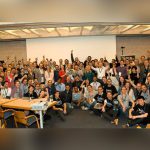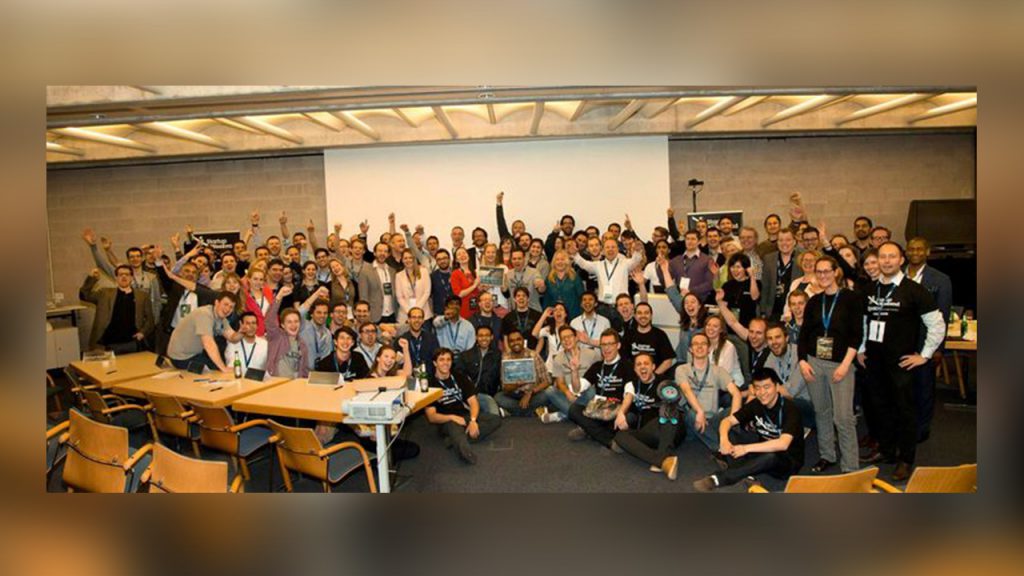Nuno Louro is the Co-Founder and Director of Innoflair, a software development company specialising in the space industry. With a background in software and engineering, he is keen on finding innovative solutions to the unique challenges the space industry presents. With Innoflair he plans to do just that!
Spaceoneers: How did the idea for your business come about?
Nuno Louro: The founders’ individual involvement in the space industry goes back many years. The experience gathered made us increasingly aware of the potential to innovate in a rather conservative sector. Before we started Innoflair we worked together for already several years in a company, which got sold to a third company. Sometime following the acquisition we decided to leave, join our forces and start a new, forward-looking business with a strong focus on innovation.
Spaceoneers: How did you come up with the name for your business?
Nuno Louro: Finding a suitable name that we could identify ourselves with was not an easy task to say the least. We started by putting together a list of possible names and then we voted for these names and came to short list. No one was really happy about the names in this shortlist and we took no immediate decision. A couple of days later my partners Rob and Radim sat together a morning and came up with a completely new name – Innoflair. They told us about the new name and after all the discussion we had had, this name simply sounded good and became our name.
Spaceoneers: What is your Technology Readiness Level or Agile? Why?
Nuno Louro: We have a mixed team where we have different mindsets. We have some people who are more conservative and others who are more innovative. It’s no surprise that the more conservative people work closer to the maintenance of systems we have deployed. At the same time we are lucky to work with growing businesses that constantly have new problems to solve and are willing to try new solutions. This is great because we have some very innovative people in our team who are always looking on what is out there.
Overall I think we have a good mix of skills and views and are able to reach compromises, which allow us to be very innovative specially when compared to other companies in the industry.
The projects we work on range from TRL 2/3 (ESA scale) – studies, proofs of concept, etc. – to TRL 9 – applications deployed and used operationally.
Spaceoneers: Who and what are your influences? Why?
Nuno Louro: I love to read and I think there were three books that influenced most just before the beginning of the company. The first one was recommend to me by a professor at ISU who gave an optional workshop about team leading. I asked him for a recommendation for a management book and he recommended the book Emotional Intelligence by Daniel Goleman. This is really a great book. In our team we all have a technical background but often our challenges are really not technical at all.
The second book was the Getting Things Done by David Allen. I had seen someone commenting about it on Facebook and on the same day Rob told me about it. Normally that would really not my type of book, but given the coincidence I ordered a copy and started reading it and applying it’s principles. I must confess I never finished it, as I then complemented it with other materials and simply made the GTD working for me. Soon after I started using GTD my colleagues starting thinking of me as the most organised of us all.
The third book was the “The 7 Habits of Highly Effective People” by Stephen R. Covey. My best friend recommended this book to me. Later I found out he hadn’t actually read it but he had seen it in the list of recommended books for Cornell graduates. This is really a good book that helps one define goals and setup a policy that makes it easy to take decision. I like the split of the seven habits into 3+3+1, where the first three depend only on one self, the next three are related to one’s interactions with people and of course the seventh that makes the case on how one can never be too busy to work on oneself.
Spaceoneers: What were the biggest challenges to starting your business?
Nuno Louro: I used my network of friends before we started to find about doing business in Germany. I was lucky to get some good recommendations from which we found our accountants and notary. This is pretty important because there will be difficulties and it’s important to have good people on your side to help you solve them. In our particular case one episode was that it took almost three months to get our company VAT number without which we could simply not send any invoices.

Spaceoneers: How did you stay motivated to overcome these challenges?
Nuno Louro: I knew we had a viable business and I wanted to make it happen. Everyone in the team knows that our work together is worth more than separately. Once we started we made a big effort to make our main client happy. We had worked with this client before and we had to show we could deliver in the new context. We are a very resilient team and we don’t throw the towel until things are done.
I had a lot of trust we would pull this off so it was just a question of staying cool. I think one of the biggest challenges is really how one deals with the issues and setbacks oneself. I had been involved in starting businesses before but I was never so involved in the company management as I have been in Innoflair. The biggest surprise to me is how lonely it is the experience of starting a company even when you are part of a team. In my case it sports and long walks in the woods helped to relax and stay focused.
Spaceoneers: How did you get investors behind your idea?
Nuno Louro: We self funded the company. As we work mostly with open-source technologies most the important asset we have are really our brains. We started by working from home while searching for an office. In the first few months some of us were actually hosting our servers at home. As we started with little expenses we were able to build our cash flow fairly quickly and that brought us the stability needed to innovate. We can see that things could move.

Spaceoneers: How did you get a team together to develop your product/ service?
Nuno Louro: The core founders had worked together several years so we were already a team when we started.
Spaceoneers: How did you get customers interested in your product/ service?
Nuno Louro: We already had a personal relationship with our clients before we started. The customers were worried initially and we worked hard to show we could deliver in the new context. Since then we have created a stable business, which has allowed us to start thinking about the next steps. We have a huge amount of expertise in mission support systems software, which we have accumulated over the years. We want to leverage on this expertise and develop our own line of products, which we can then customise to meet the clients specific needs. We have already developed and sold our two first products: Innoflair Logbook and Innoflair Plan. I invite to look at our website to find out a little more about what we do.
Spaceoneers: What technologies and trends, do you think, will drive the biggest changes in your industry over the next two years?
Nuno Louro: The space industry is generally not so fond of the latest technologies although I think that is changing fast. Reliability will always be the key but it’s easier and cheaper to test new things today.
In our case we can see that users are less and less willing to accept ugly, non-functional applications interfaces where you need training to be able to use it. If you have a system that is very good in some aspects but that doesn’t have a good interface then it’s not usable and is therefore useless. The design of the user experience is something that the users are already demanding even if they don’t know these terms. Naturally when one develops custom specific applications one doesn’t have the same budget of big internet companies to work on a design. But a little sensibility can take one quite far in improving any interface.
One new technology that we’ve been using on the backend side lately is Docker. We are in the process of compiling our applications and we have already deployed a few in production. This has proven to be a great decision that makes our life as developer and the lives of our clients easier. I think it can cut the costs of maintaining an application over the years by a significant amount and at the same.
Spaceoneers: How will those trends and technologies affect your value proposition in the near future?
Nuno Louro: We’ve had graphic designers with us since the beginning of Innoflair. Over the years our engineering team has also developed a sensibility that you don’t find in other companies. Just take a look at products that are being delivered today. Often there is no designer involved in product development. I think we are in a good position to win more consultancy work and sell our products.
Spaceoneers: What important advice would you give to others who are interested in starting their own space startup?
Nuno Louro: This is a difficult one but I’d say is ‘be prepared for the worst case’ mentally and financially. Once prepared, you can tell yourself what Cristiano Ronaldo told his teammates: “if we don’t make it, screw it”. In that case if it doesn’t work just take a nice holiday.
Spaceoneers: What makes you a spaceoneer (space pioneer)?
Nuno Louro: I think I’ve always been a scout-minded person and that’s an important trait for an entrepreneur. The space sector is definitely a very exciting one and I feel privileged to be part of this industry.

